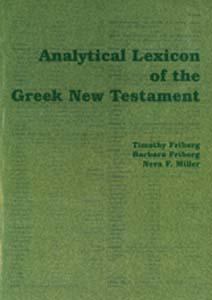The Analytical Lexicon of the Greek New Testament (ANLEX)

The Analytical Lexicon of the Greek New Testament (ANLEX) was developed mainly by Neva Miller, a lifetime teacher of Koine Greek at the college level and sometime Bible translation consultant to teams in the field. It was nearly twenty years in preparation and has met a real need that we hadn’t quite anticipated.
A typical misunderstanding of translation or, for that matter, of learning any foreign language is that there is an invariable one-to-one correspondence between, say, English and Greek. It is thought that any word of Greek may be substituted by its corresponding English gloss in any and every context, one for one. Of course, that is not true, especially because languages develop in independent and unique directions. The way Greek cuts the meaning pie is decidedly different from the way it is cut in English.
ANLEX addresses the issues of meaning very thoughtfully, recognizing besides extensive literal usages (a house is a house is a house) many figurative usages that make language so intensely interesting. Thus, ANLEX for each and every next lemma (citation form; alternatively, keyword) gives a well-developed presentation of the word under review that includes its possible idiomatic and metaphorical usages.
There are a number of scholarly lexicons available (that is, Greek-English), particularly BDAG (A Greek-English Lexicon of the New Testament and other Early Christian Literature, third edition, revised and edited by Frederick William Danker, based on Walter Bauer’s German original). While excellent for the scholar, it frankly is a bit overwhelming for a new student of Koine Greek or a translator in his field location. ANLEX was developed just to fill the place of indispensable friend for the more ordinary learners and readers of Greek.
The shortened name ANLEX rightly points to the two independent parts of the lexicon. LEX speaks to the analytical LEXICON just described. AN, on the other hand, speaks to the ANALYTICAL lexicon, containing a full list of all Greek words relating to the Greek New Testament, in whatever version they might occur. As such this listing gives the morpho-grammatical parsing of each successive Greek word in the text in a concise statement and points the user to the underlying lemma form. This is identical with the “tags” that are found interleaved with the Greek text in the Analytical Greek New Testament (AGNT). The listing in ANLEX, unlike the canonical nature of AGNT, give the words in alphabetical arrangement from alpha to omega.
Most electronic uses of ANLEX tie it to the running text of the Greek New Testament. The usual form of that is for the user to hover his cursor over a Greek word to which there appears a media box with the corresponding ANLEX entry. Or a user can in more traditional manner scroll through the text of ANLEX—or stroll through its hundreds of pages looking for the word he is needing an explication of or comparing two different “write-ups” of similar or related Greek words.
ANLEX is meant to be user friendly in the extreme. Toward that end it begins with an introduction that explains the major features found with its pages.
Though ANLEX has those commending it, we have always known that we could do better. Thus we are currently underway in a decade-long revision project that will make ANLEX ever so much better, all the while retaining its eminently easy to use, student orientation.
Click on section of ANLEX in the website menu, or click on a link below.
ANLEX INTRODUCTION
ANLEX APPENDIX 1 Crossed-over Adjectives
ANLEX APPENDIX 2 A Theory of Deponent Verbs
ANLEX APPENDIX 3 Glossary
ANLEX APPENDIX 4 Beyond Deponency
ANLEX APPENDIX 4a Retrospect: Beyond Deponency